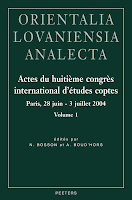Article Note: "Body Metaphors in 1 Corinthians and in the Interpretation of Knowledge (NHC XI,1)" by Ismo Dunderberg
/ Professor Dunderberg just sent me an offprint of his new article that just appeared in Actes du Huitième Congrès International D'Études Coptes (eds. Nathalie Bosson and Anne Boud'hors; Leuven: Peeters, 2007) pp. 833-847. Its timing is rather convenient for the discussion that we have been having about the Gnostics and how some of them were very much part of the wider Apostolic church. As an aside, I wish to send my best to Professor Dunderberg who has just moved from Helsinki to Oxford where he will be teaching this year.
Professor Dunderberg just sent me an offprint of his new article that just appeared in Actes du Huitième Congrès International D'Études Coptes (eds. Nathalie Bosson and Anne Boud'hors; Leuven: Peeters, 2007) pp. 833-847. Its timing is rather convenient for the discussion that we have been having about the Gnostics and how some of them were very much part of the wider Apostolic church. As an aside, I wish to send my best to Professor Dunderberg who has just moved from Helsinki to Oxford where he will be teaching this year.Dunderberg argues that the author is a Pauline exegete, although he applies the body metaphor quite differently from Paul. Paul is concerned about the weak members of the body and is trying to prove that they are indispensable and concludes that God gave greater honor to them. The author of the Valentinian Interpretation, however, is concerned that the weaker members have a wrong attitude (envy) that threatens the unity of the social body. They should change their attitude or face possible expulsion.
Why did the weaker part feel envious? The stronger members have made progress in the "Word" while the rest have not. The stronger members can "speak" while the rest of the ekklesia cannot. This situation created animosity of the weaker toward the stronger.
The author makes three arguments to resolve the issue:
1. the gifts given to the stronger members will benefit all members of the ekklesia; the weaker members benefit spiritually from the more advanced in the communityDunderberg concludes, and this I like very much, that the author of this text may be responding to Irenaeus or other critics like him who accused the Valentinians of elitism. "The author of Interpretation addresses protests, such as we find in Irenaeus, against the boundary between those who have and those who do not have the spiritual gift, and responds by portraying these protests as expressions of hatred and envy" (Dunderberg, pp. 844-845).
2. all body parts are mutually dependent
3. the inferior part should be grateful that is is not outside the body or ekklesia
The author does NOT see two separate communities - the Gnostics and the Apostolic Church - but presupposes a situation of two groups within the same church and says that the inferior can gain benefit from the gift that the advanced have. "While Irenaeus wanted to make the boundary between Valentinians and other Christians as insurmountable as possible, the vision of the Christian community in Interpretation is that, instead of separation, there should be unity between the two factions of Christians" (Dunderberg, p. 845).








































































